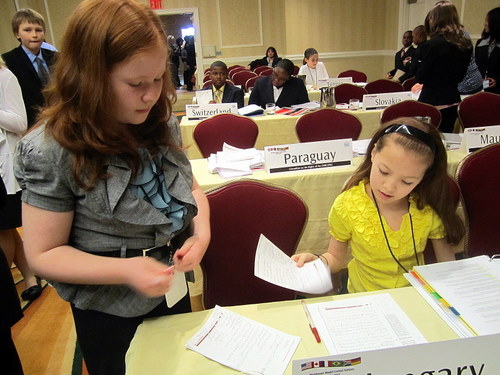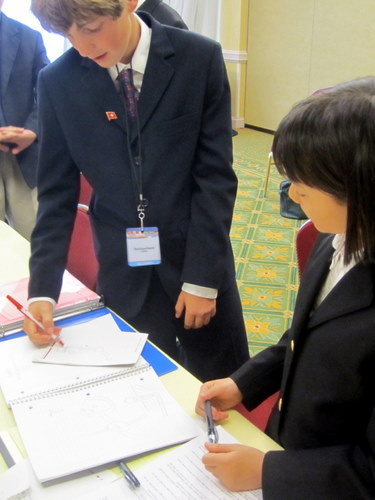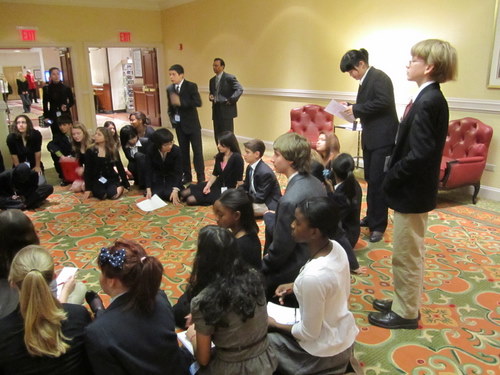Today’s guest post is by Camille Moro, a MUNer at Seton Hall University who is also a Montessori alumnus. Camille helped me live blog this weekend’s Montessori MUN conference, and in the article below, she reflects on her experience as a student of Model UN and the Montessori educational philosophy.
After a childhood of being engulfed by her ideas, both in school as a Montessori student and at home as the daughter of a Montessori teacher, Dr. Maria Montessori has become very special to me. This is how I found myself in New York at MMUN, very excited to see her impact on my favorite activity, Model UN.
That impact was evident everywhere in the conference, from the country display boards in the hall to the way the students interacted. I know that she would have been proud of the bright, young delegates in attendance.
Click “Learn More” below to read about Camille’s experience!
Dr. Montessori once said, “The prize and punishments are incentives toward unnatural or forced effort, and, therefore we certainly cannot speak of the natural development of the child in connection with them.”
Staying true to this belief, MMUN did not give awards, which created an entirely different committee atmosphere. No one dominated debate or spoke just for the sake of speaking, making each speech substantial and productive for the committee.
I walked around during unmoderated caucus and for the first time in five years of MUN did not hear a single argument over sponsorship of the working papers. Instead, all of their energy was channeled into the actual content.
The pressure caused by awards was absent, but Dr. Montessori was very much present. In her classrooms, there are no grades, allowing students to learn because they want to.
The same thing was true in the conference – the delegates voiced their opinions out of desire to be a part of the debate and the process, not to go home with a gavel. This facilitated true cooperation and true diplomacy.
It was definitely not the “unnatural or forced effort” that Dr. Montessori wished to avoid; it was authentic. They got the personal satisfaction of having contributed, which, in her method, is the only reward a person needs.
The way the delegates communicated struck me as being different as well. In true Montessori fashion, they spent most of the unmoderated caucuses sitting in a circle on the floor.
In the classroom, the circle was where we would go to discuss feelings and concerns. We usually had an object that we would pass around to establish who had speaking privileges at the moment.
I was taken back to those days as I watched a group – completely unprompted by the dais or advisors – gather and decide that the only person talking should be whoever was holding a certain pen.
Taking turns does not always happen during caucusing, but these delegates were genuinely interested in hearing the others’ ideas rather than focusing on what they themselves were going to say next.
Of course I thought this was absolutely adorable, but I think the cutest thing was how they would raise their hands when they wanted to share something instead of calling out. Dr. Montessori was steadfast in her conviction that the whole world is a classroom, a concept that the MMUN delegates seem to have completely mastered.
My good friend M. Francesco Alberti recently gave a little speech to a group of mesmerized delegates about how the gavel embodies everything for which MUN stands.
He asked if they knew what this was. “Peace,” some answered. “Security,” said others. “Even broader than that,” he told them – “It’s education.”
Of course, education is everything that Dr. Montessori stood for as well. She believed so strongly in its power that she would tell aspiring educators that “establishing lasting peace is the work of education; all politics can do is keep us out of war.”
She would have felt so gratified seeing how well MMUN combined her techniques with such a stimulating outlet for a child’s creative potential. For Dr. Montessori, seeing kids engage in discussions beyond their years would have been nothing new since her methods are so conducive to mature thinking.
I, on the other hand, am still wrapping my brain around the fact that every MMUN delegate was 14 or under, yet was passionately discussing such intense topics as nuclear weapons, world food security, and repatriation of refugees, while actually coming up with logical and intelligent potential solutions.
Another solid belief of Dr. Montessori’s was that “within the child lies the fate of the future.” And I believe her. After hearing these kids, I dare say that things are looking quite bright.

Elementary school delegates in the Committee on the Rights of the Child -- children discussing the rights of children



